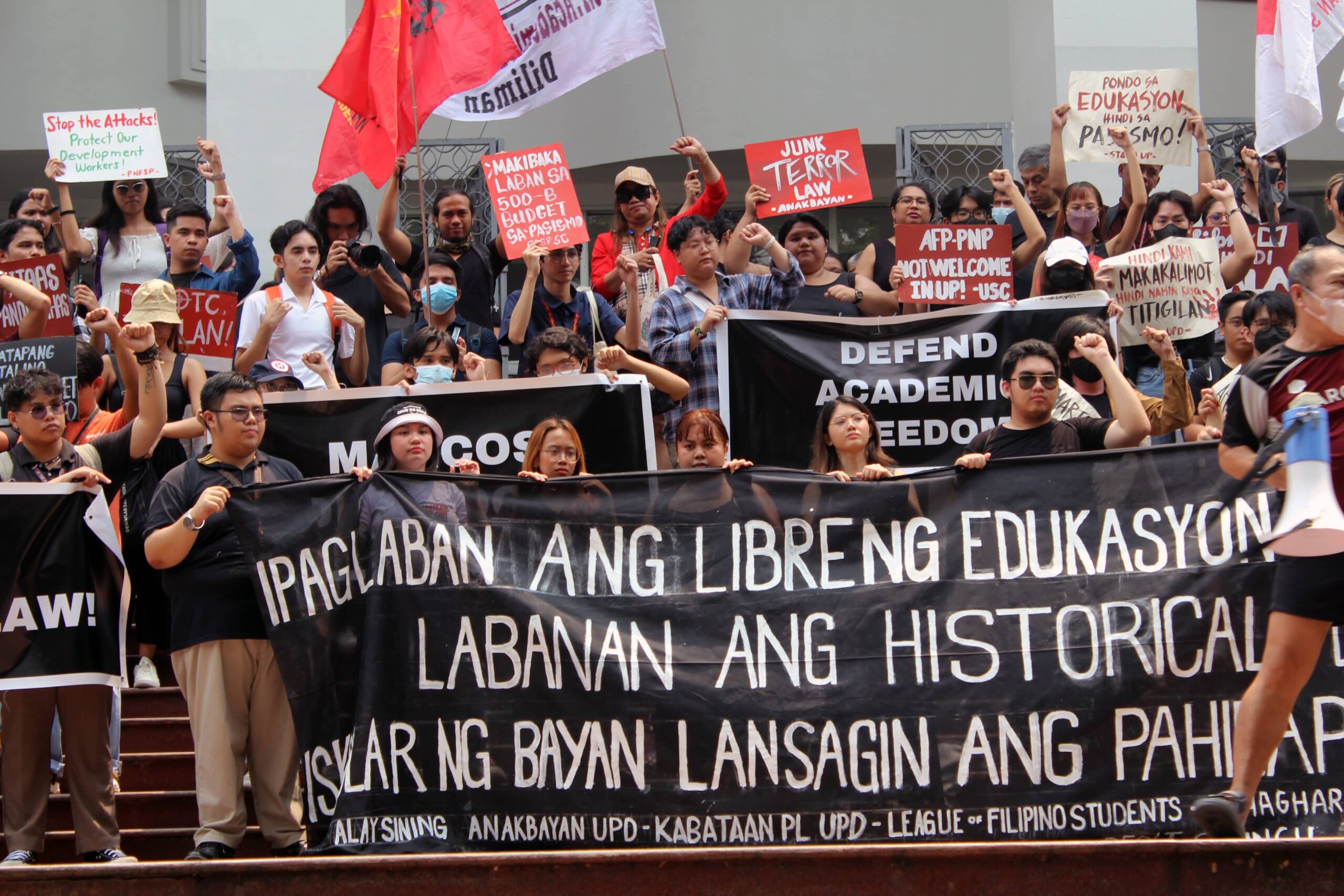On September 21, the sounds of protest and remembrance resonated through the University of the Philippines (UP) Diliman as the campus marked 51 years since the proclamation of Martial Law by late dictator Ferdinand Marcos Sr. in 1972.
The UP Diliman community came together for a one-hour event to make noise in memory of the dark era, following a memorandum from UP President Angelo Jimenez issued on September 18.
“This activity is intended to demonstrate that the University will continue to be a bulwark of academic freedom and human rights in the light of attempts at historical revisionism and red-tagging to suppress dissent,” Jimenez said in the memorandum.
Different units held several activities to join the commemoration. Traditional ethnic instruments were played on the UP College of Music lawn. UP Theater Complex and UP Diliman Information Office staff rang the Carillon bells to recall their use during the First Quarter Storm in 1971.
The activities culminated in a rally at Palma Hall and Quezon Hall where faculty, staff, and students listened to speakers who recounted the atrocities committed during the Marcos dictatorship.
In a joint statement, the UP Diliman University Student Council together with other student formations joined the entire University System in remembering the regime.
“Sa madilim na bahaging ito ng ating kasaysayan, milyon-milyong Pilipino ang nagdusa dahil sa pangingibabaw ng interes ng mga Marcos. Habang ang sambayanan ay lugmok sa kahirapan, tuloy-tuloy ang pagwaldas ng mga Marcos at ng kaniyang mga alipores sa kaban ng bayan. Niloko ng mga Marcos ang sambayanan sa kaliwa’t kanang proyektong pangkaunlaran, habang ang katotohanan ay pinapaslang, ikinukulong, at inaabuso ang malawak na hanay ng masang lumalaban para sa karapatan,” they said.
(In this dark chapter of our history, millions of Filipinos suffered because of the Marcoses. While the nation was drowning in poverty, the Marcoses and their cronies squandered the nation’s coffers. The Marcoses deceived the public with various development projects, all the while the truth was being suppressed, and a vast number of the masses fighting for their rights were being killed, imprisoned, and abused.)
“Karumal-dumal na sa kasalukuyan ay pilit binubura sa kasaysayan ang mga Pilipinong tumindig para sa demokrasya, habang ang mga Marcos ay muling nakaupo sa Malacañan gawa ng naratibong kanilang pilit na ibinaluktot,” they continued.
(It is horrific that in the present, there is a deliberate attempt to erase from history those Filipinos who stood up for democracy, while the Marcoses are once again in power in Malacañan, thanks to the narrative they have forcibly distorted.)
“Limampu’t isang taon na ang nakalilipas ngunit narito pa rin táyo. Wala pang kalahati sa termino ni Marcos, Jr. ay lalong nilugmok sa pagkakautang ang ating bansa, pinipilayan ang mga batayang sektor ng ating lipunan.”
(51 years have passed, but here we still stand. Not even halfway through Marcos Jr.’s term, our country has sunk even deeper into debt, crippling the foundational sectors of our society.)
The official social media accounts of UP units also went dark, changing their profile images to black or grayscale. They shared a special 61-minute video highlighting Martial Law events and the Marcos dictatorship’s pervasive censorship.
Meanwhile, in response to recent changes in the basic education curriculum, the UP Department of History previously condemned the Department of Education’s directive to remove the ‘Marcos’ name from ‘Marcos Dictatorship’.
They likened this revisionism to attempts to absolve figures like Adolf Hitler from historical crimes. The Department stressed the need for accuracy in teaching history.
“Ang pagbura sa pangalang ‘Marcos’ sa ‘diktadura’ ay hindi lámang magbubunga ng pagkalito sa mga mag-aaral ng kasaysayan at mamamayang Pilipinong naging saksi sa panahong ito ng ating kasaysayan. Ito ay magdudulot din ng pagkalimot sa ating nakaraan hindi lámang para sa mga bata at mag-aaral ng ating kasaysayan, kundi maging sa mag-aaral ng kasaysayan at mamamayan ng ibang bansa na naging saksi at nakapulot ng aral mula sa ating naging karanasan upang pangalagaan ang kanilang demokrasya at mga karapatang biyaya nito,” the History Department said.
(Erasing the name ‘Marcos’ from ‘dictatorship’ will not only result in confusion among history students and Filipino citizens who witnessed this period in our history. It will also cause a forgetting of our past, not just for the young and students of our history, but also for students of history and citizens of other countries who have witnessed and learned from our experience to safeguard their democracy and the rights it bestows.)
“Nais din naming ipahayag na ang pagtanggal sa pangalang ‘Marcos’ sa diktadura ay maaari ring maging lunsaran ng iba pang ‘paglilinis’ sa kasaysayan. Huwag nating ibaon sa limot ang napagtagumpayan sa EDSA People Power noong 1986. Sa pagtanggal sa pangalang ‘Marcos’ sa diktadura, mabubura sa kasaysayan at matatanggalan din ng saysay ang pagkilos sa EDSA na naging susi upang mabawi natin ang ating demokrasya.”
(We also wish to express that removing the name ‘Marcos’ from ‘dictatorship’ might also pave the way for further ‘whitewashing’ of history. Let us not forget the triumph of the EDSA People Power in 1986. By removing the name ‘Marcos’ from ‘dictatorship’, this significant movement in EDSA, which became the key to reclaiming our democracy, will be erased from history and its importance diminished.)
In 2018, former UP President Danilo Concepcion declared September 21 of every year as the UP Day of Remembrance “in honor of UP’s contributions to the fight against dictatorship and despotism.”

